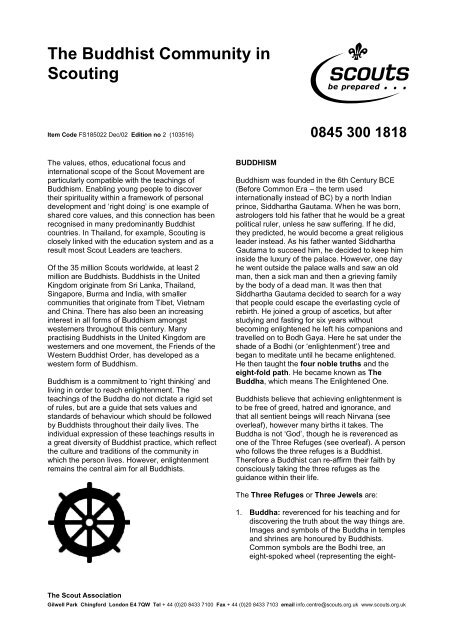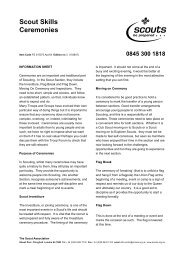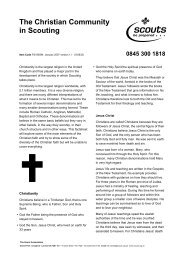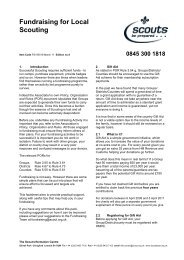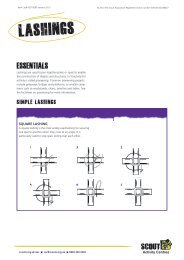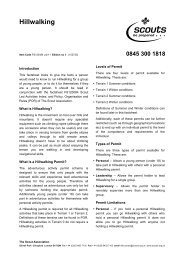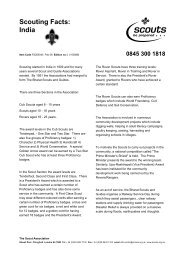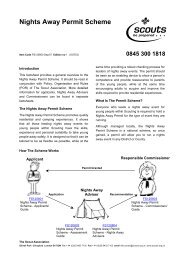The Buddhist Community in Scouting - ScoutBase UK
The Buddhist Community in Scouting - ScoutBase UK
The Buddhist Community in Scouting - ScoutBase UK
You also want an ePaper? Increase the reach of your titles
YUMPU automatically turns print PDFs into web optimized ePapers that Google loves.
<strong>The</strong> <strong>Buddhist</strong> <strong>Community</strong> <strong>in</strong><br />
Scout<strong>in</strong>g<br />
S<br />
Item Code FS185022 Dec/02 Edition no 2 (103516) 0845 300 1818<br />
<strong>The</strong> values, ethos, educational focus and<br />
<strong>in</strong>ternational scope of the Scout Movement are<br />
particularly compatible with the teach<strong>in</strong>gs of<br />
Buddhism. Enabl<strong>in</strong>g young people to discover<br />
their spirituality with<strong>in</strong> a framework of personal<br />
development and „right do<strong>in</strong>g‟ is one example of<br />
shared core values, and this connection has been<br />
recognised <strong>in</strong> many predom<strong>in</strong>antly <strong>Buddhist</strong><br />
countries. In Thailand, for example, Scout<strong>in</strong>g is<br />
closely l<strong>in</strong>ked with the education system and as a<br />
result most Scout Leaders are teachers.<br />
Of the 35 million Scouts worldwide, at least 2<br />
million are <strong>Buddhist</strong>s. <strong>Buddhist</strong>s <strong>in</strong> the United<br />
K<strong>in</strong>gdom orig<strong>in</strong>ate from Sri Lanka, Thailand,<br />
S<strong>in</strong>gapore, Burma and India, with smaller<br />
communities that orig<strong>in</strong>ate from Tibet, Vietnam<br />
and Ch<strong>in</strong>a. <strong>The</strong>re has also been an <strong>in</strong>creas<strong>in</strong>g<br />
<strong>in</strong>terest <strong>in</strong> all forms of Buddhism amongst<br />
westerners throughout this century. Many<br />
practis<strong>in</strong>g <strong>Buddhist</strong>s <strong>in</strong> the United K<strong>in</strong>gdom are<br />
westerners and one movement, the Friends of the<br />
Western <strong>Buddhist</strong> Order, has developed as a<br />
western form of Buddhism.<br />
Buddhism is a commitment to „right th<strong>in</strong>k<strong>in</strong>g‟ and<br />
liv<strong>in</strong>g <strong>in</strong> order to reach enlightenment. <strong>The</strong><br />
teach<strong>in</strong>gs of the Buddha do not dictate a rigid set<br />
of rules, but are a guide that sets values and<br />
standards of behaviour which should be followed<br />
by <strong>Buddhist</strong>s throughout their daily lives. <strong>The</strong><br />
<strong>in</strong>dividual expression of these teach<strong>in</strong>gs results <strong>in</strong><br />
a great diversity of <strong>Buddhist</strong> practice, which reflect<br />
the culture and traditions of the community <strong>in</strong><br />
which the person lives. However, enlightenment<br />
rema<strong>in</strong>s the central aim for all <strong>Buddhist</strong>s.<br />
BUDDHISM<br />
Buddhism was founded <strong>in</strong> the 6th Century BCE<br />
(Before Common Era – the term used<br />
<strong>in</strong>ternationally <strong>in</strong>stead of BC) by a north Indian<br />
pr<strong>in</strong>ce, Siddhartha Gautama. When he was born,<br />
astrologers told his father that he would be a great<br />
political ruler, unless he saw suffer<strong>in</strong>g. If he did,<br />
they predicted, he would become a great religious<br />
leader <strong>in</strong>stead. As his father wanted Siddhartha<br />
Gautama to succeed him, he decided to keep him<br />
<strong>in</strong>side the luxury of the palace. However, one day<br />
he went outside the palace walls and saw an old<br />
man, then a sick man and then a griev<strong>in</strong>g family<br />
by the body of a dead man. It was then that<br />
Siddhartha Gautama decided to search for a way<br />
that people could escape the everlast<strong>in</strong>g cycle of<br />
rebirth. He jo<strong>in</strong>ed a group of ascetics, but after<br />
study<strong>in</strong>g and fast<strong>in</strong>g for six years without<br />
becom<strong>in</strong>g enlightened he left his companions and<br />
travelled on to Bodh Gaya. Here he sat under the<br />
shade of a Bodhi (or „enlightenment‟) tree and<br />
began to meditate until he became enlightened.<br />
He then taught the four noble truths and the<br />
eight-fold path. He became known as <strong>The</strong><br />
Buddha, which means <strong>The</strong> Enlightened One.<br />
<strong>Buddhist</strong>s believe that achiev<strong>in</strong>g enlightenment is<br />
to be free of greed, hatred and ignorance, and<br />
that all sentient be<strong>in</strong>gs will reach Nirvana (see<br />
overleaf), however many births it takes. <strong>The</strong><br />
Buddha is not „God‟, though he is reverenced as<br />
one of the Three Refuges (see overleaf). A person<br />
who follows the three refuges is a <strong>Buddhist</strong>.<br />
<strong>The</strong>refore a <strong>Buddhist</strong> can re-affirm their faith by<br />
consciously tak<strong>in</strong>g the three refuges as the<br />
guidance with<strong>in</strong> their life.<br />
<strong>The</strong> Three Refuges or Three Jewels are:<br />
1. Buddha: reverenced for his teach<strong>in</strong>g and for<br />
discover<strong>in</strong>g the truth about the way th<strong>in</strong>gs are.<br />
Images and symbols of the Buddha <strong>in</strong> temples<br />
and shr<strong>in</strong>es are honoured by <strong>Buddhist</strong>s.<br />
Common symbols are the Bodhi tree, an<br />
eight-spoked wheel (represent<strong>in</strong>g the eight-<br />
<strong>The</strong> Scout Association<br />
Gilwell Park Ch<strong>in</strong>gford London E4 7QW Tel + 44 (0)20 8433 7100 Fax + 44 (0)20 8433 7103 email <strong>in</strong>fo.centre@scouts.org.uk www.scouts.org.uk
page 2 of 5<br />
fold path with<strong>in</strong> the cycle of life) and lotus<br />
flowers.<br />
2. Dharma: Buddha‟s teach<strong>in</strong>gs, which <strong>in</strong>clude<br />
the four noble truths and the eight-fold path<br />
(see below).<br />
3. Sangha: the community of those who follow<br />
the <strong>Buddhist</strong> path.<br />
Gautama Buddha taught that by follow<strong>in</strong>g the<br />
teach<strong>in</strong>gs a person can be released from the<br />
cycle of death and re-birth and reach Nirvana - a<br />
state of bliss. He expla<strong>in</strong>ed Dharma (the<br />
teach<strong>in</strong>gs) us<strong>in</strong>g a parable <strong>in</strong> which a man<br />
crosses a wide river on a raft. <strong>The</strong> raft carries the<br />
traveller from fear to safety, and so he wonders<br />
whether to keep such a useful object for the rest<br />
of his travels. Buddha taught that the raft was for<br />
“gett<strong>in</strong>g across, not for reta<strong>in</strong><strong>in</strong>g”, <strong>in</strong> other words<br />
that right teach<strong>in</strong>g takes a person on to the next<br />
stage <strong>in</strong> their journey towards Nirvana. Once they<br />
have reached this stage they need new teach<strong>in</strong>g<br />
to go further.<br />
Dharma <strong>in</strong>cludes:<br />
<strong>The</strong> Four Noble Truths<br />
Dukkha: suffer<strong>in</strong>g is part of life.<br />
Samudaya: suffer<strong>in</strong>g occurs as a result of selfish<br />
desires.<br />
Nirodha: suffer<strong>in</strong>g will cease if we let go of these<br />
desires.<br />
Marga: the way to let go of desire is to follow the<br />
eight-fold path.<br />
<strong>The</strong> Eight-fold Path<br />
Right Viewpo<strong>in</strong>t. <strong>The</strong> first step to happ<strong>in</strong>ess is to<br />
look at life from the right viewpo<strong>in</strong>t, understand<strong>in</strong>g<br />
suffer<strong>in</strong>g and the end of suffer<strong>in</strong>g.<br />
Right Values. <strong>The</strong> right way to go about obta<strong>in</strong><strong>in</strong>g<br />
the th<strong>in</strong>gs people hope for is to give them their<br />
true value. K<strong>in</strong>dness and love are true values, but<br />
a person always th<strong>in</strong>k<strong>in</strong>g of I/me/m<strong>in</strong>e has got<br />
false values.<br />
Right Speech. Follow<strong>in</strong>g this path a person will<br />
be wise and helpful <strong>in</strong> what they say and will not<br />
boast, gossip or lie.<br />
Right Behaviour. Buddha taught that this comes<br />
from do<strong>in</strong>g good for its own sake not for reward,<br />
and that people should “overcome evil with good”.<br />
Right Liv<strong>in</strong>g. A person should work to the best of<br />
their ability <strong>in</strong> an occupation which helps rather<br />
than harms liv<strong>in</strong>g be<strong>in</strong>gs.<br />
Right Effort. A person should learn to know<br />
themselves and follow the eight-fold path at their<br />
own pace. <strong>The</strong>y should avoid evil th<strong>in</strong>gs and<br />
develop th<strong>in</strong>gs which give merit, such as love,<br />
thoughtfulness and concentration.<br />
Right M<strong>in</strong>dfulness. A person should develop an<br />
attentive calm m<strong>in</strong>d free from unnecessary wants<br />
<strong>in</strong> the search for happ<strong>in</strong>ess, for example want<strong>in</strong>g<br />
to eat does not make you unhappy, but an<br />
unnecessary desire to eat does.<br />
Right Contemplation. To learn how to control the<br />
m<strong>in</strong>d so that a person can develop a calm and<br />
happy m<strong>in</strong>d.<br />
SACRED TEXTS<br />
Buddhism does not have a s<strong>in</strong>gle authoritative<br />
holy book. Instead, <strong>Buddhist</strong>s follow the Buddha‟s<br />
teach<strong>in</strong>gs that are written <strong>in</strong> scriptures which were<br />
orig<strong>in</strong>ally memorised and passed down orally by<br />
monks. <strong>Buddhist</strong>s also study texts that record the<br />
words of great <strong>Buddhist</strong> monks and teachers.<br />
<strong>The</strong>ravada <strong>Buddhist</strong>s believe that the scriptures<br />
written <strong>in</strong> Pali (an ancient Indian language) have<br />
authority.<br />
WORSHIP AND PRAYER<br />
<strong>The</strong> central <strong>Buddhist</strong> belief is karma (the law of<br />
cause and effect) where good thoughts, word and<br />
deeds have good consequences and vice versa.<br />
<strong>Buddhist</strong> rituals are practised <strong>in</strong>dividually, and are<br />
seen as an important way to achieve good karma.<br />
Common rituals <strong>in</strong>clude mak<strong>in</strong>g offer<strong>in</strong>gs of<br />
flowers, <strong>in</strong>cense, food or (occasionally) money<br />
before an image or symbol of Buddha, and<br />
walk<strong>in</strong>g around an image of Buddha or a temple<br />
(always keep<strong>in</strong>g the image to the right as a mark<br />
of respect).<br />
A <strong>Buddhist</strong> holy place can be a temple, a shr<strong>in</strong>e<br />
or a place where relics of Buddha or <strong>Buddhist</strong><br />
sa<strong>in</strong>ts are placed. <strong>The</strong>se are called stupas <strong>in</strong><br />
India, pagodas <strong>in</strong> Japan, chortens <strong>in</strong> Tibet and<br />
dagobas <strong>in</strong> Sri Lanka, and are built to symbolise<br />
the five elements:<br />
ether<br />
water<br />
fire<br />
air<br />
earth
page 3 of 5<br />
Most <strong>Buddhist</strong>s have a shr<strong>in</strong>e or a statue of<br />
Buddha <strong>in</strong> their own home, and there are temples<br />
<strong>in</strong> most large cities <strong>in</strong> Brita<strong>in</strong>.<br />
<strong>The</strong> pr<strong>in</strong>cipal form of spiritual practice is<br />
meditation. In general there are two stages of<br />
meditation. <strong>The</strong> first is to concentrate on an object<br />
(such as a flower, some water or a flame) so that<br />
the m<strong>in</strong>d becomes calm and peaceful. <strong>The</strong><br />
second is to seek <strong>in</strong>sight <strong>in</strong>to the nature of th<strong>in</strong>gs<br />
and to follow the Buddha <strong>in</strong> seek<strong>in</strong>g<br />
enlightenment. This enables the <strong>Buddhist</strong> to go<br />
beyond the calm m<strong>in</strong>d to Nirvana itself.<br />
Other forms of prayer largely reflect the country a<br />
<strong>Buddhist</strong> is from. Some Mahayana <strong>Buddhist</strong>s say<br />
mantras (sounds or words believed to have a<br />
good effect), for example “Om mani padme hum”.<br />
„Om‟ signifies the whole of the universe and „mani<br />
padme hum‟ (literally „the jewel <strong>in</strong> the lotus‟)<br />
signifies that the truth is <strong>in</strong> the teach<strong>in</strong>gs. Other<br />
<strong>Buddhist</strong>s use prayer wheels or cyl<strong>in</strong>ders, which<br />
are turned so that holy words carved on them can<br />
send good effects <strong>in</strong> to the world. Others use<br />
prayer flags so that the w<strong>in</strong>d can carry the words<br />
pr<strong>in</strong>ted on them away.<br />
FESTIVALS, HOLY DAYS AND RETREAT<br />
In Buddhism there is an emphasis on daily<br />
personal contemplation and devotion. Most<br />
<strong>Buddhist</strong> families do worship together, but this<br />
worship usually reflects their own personal<br />
circumstances - a family member may be tak<strong>in</strong>g<br />
an exam or go<strong>in</strong>g on a journey - rather than<br />
because it is a particular day of the week. Devout<br />
lay <strong>Buddhist</strong>s follow all ten precepts (see below)<br />
on Uposatha Days, which are sacred days which<br />
mark the four stages of the moon <strong>in</strong> each month.<br />
Asala or Dhammacakka Day (Turn<strong>in</strong>g of the<br />
Wheel of Teach<strong>in</strong>g) usually occurs <strong>in</strong> July. It<br />
celebrates the first proclamation by Gautama<br />
Buddha <strong>in</strong> which he taught the middle way, the<br />
noble eight-fold path and the four noble truths.<br />
Asala also marks the beg<strong>in</strong>n<strong>in</strong>g of Retreat (see<br />
below).<br />
Vaisakha Puja or Wesak is celebrated <strong>in</strong> May or<br />
June, and is when <strong>The</strong>ravada <strong>Buddhist</strong>s celebrate<br />
the birth, enlightenment and f<strong>in</strong>al pass<strong>in</strong>g away of<br />
Gautama Buddha. Temples are decorated with<br />
lanterns and garlands, and people send Wesak<br />
cards. Mahayana <strong>Buddhist</strong>s celebrate these<br />
events separately. <strong>The</strong> festival of Buddha‟s birth<br />
(called Hana Matsuri <strong>in</strong> Japan) is celebrated <strong>in</strong><br />
April or May. Bodhi Day <strong>in</strong> December<br />
commemorates Buddha‟s atta<strong>in</strong>ment of<br />
Enlightenment under the Bodhi Tree. Par<strong>in</strong>irvana<br />
held <strong>in</strong> February commemorates the pass<strong>in</strong>g from<br />
this world of Gautama Buddha at Kush<strong>in</strong>agara <strong>in</strong><br />
India at the age of 80.<br />
Poson or Dhamma Vijaya is celebrated <strong>in</strong> June.<br />
It is a <strong>The</strong>ravada <strong>Buddhist</strong> festival that celebrates<br />
the first preach<strong>in</strong>g of the <strong>Buddhist</strong> doctr<strong>in</strong>e outside<br />
India (particularly marked <strong>in</strong> Sri Lanka).<br />
Kath<strong>in</strong>a Day is celebrated <strong>in</strong> October. At the end<br />
of three months of Retreat, <strong>The</strong>ravada <strong>Buddhist</strong><br />
monks receive new Kath<strong>in</strong>a robes (symbolically<br />
made from rags stitched together) which are<br />
offered by lay people. <strong>The</strong> date varies accord<strong>in</strong>g<br />
to the ra<strong>in</strong>y season <strong>in</strong> different countries.<br />
Lay Krathong (float<strong>in</strong>g candle festival) is<br />
celebrated by <strong>The</strong>ravada <strong>Buddhist</strong>s. It symbolises<br />
the Buddha‟s comparison of the Dharma to a raft<br />
that carries a person across the river of ignorance.<br />
It is a time for giv<strong>in</strong>g thanks to, and ask<strong>in</strong>g<br />
forgiveness from, the water spirits.<br />
<strong>The</strong> <strong>Buddhist</strong> Retreat occurs dur<strong>in</strong>g the ra<strong>in</strong>y<br />
season. It is when <strong>Buddhist</strong> monks, who might be<br />
jo<strong>in</strong>ed by lay people, rema<strong>in</strong> <strong>in</strong> one place <strong>in</strong> order<br />
to devote their time to study and meditation. Many<br />
<strong>Buddhist</strong> societies <strong>in</strong> the <strong>UK</strong> own places for<br />
retreat, and some arrange family retreats so that<br />
<strong>Buddhist</strong> parents can fulfil their need to retreat<br />
whilst also tak<strong>in</strong>g care of their children.<br />
VALUES<br />
<strong>The</strong> Buddha taught that enlightenment is found by<br />
follow<strong>in</strong>g the middle way - by liv<strong>in</strong>g calmly and<br />
without extremes of pleasure or sorrow. Sangha<br />
(spiritual life) is directed by the Dharma and is<br />
shown by the Ten Precepts (undertak<strong>in</strong>gs).<br />
<strong>Buddhist</strong>s should undertake the rule of tra<strong>in</strong><strong>in</strong>g to<br />
refra<strong>in</strong> from:<br />
1. harm<strong>in</strong>g life;<br />
2. tak<strong>in</strong>g what is not given;<br />
3. be<strong>in</strong>g unchaste;<br />
4. false speech;<br />
5. drugs or dr<strong>in</strong>k which cloud the m<strong>in</strong>d.<br />
All <strong>Buddhist</strong>s aim to follow the first five precepts<br />
throughout their life. Those that dedicate<br />
themselves to their sangha (the monastic<br />
community and lay people liv<strong>in</strong>g <strong>in</strong> monasteries)<br />
also follow the latter five precepts daily:<br />
6. to be <strong>in</strong>temperate <strong>in</strong> eat<strong>in</strong>g and to not eat after<br />
noon;
page 4 of 5<br />
7. to not engage <strong>in</strong> or witness s<strong>in</strong>g<strong>in</strong>g, danc<strong>in</strong>g<br />
or the theatre;<br />
8. to not use garlands, perfumes or ornaments;<br />
9. to give up wealth and power („to not use high<br />
or luxurious beds‟);<br />
10. to give up money („to not accept gifts of gold<br />
or silver‟).<br />
BEHAVIOUR AND LIFE STYLE<br />
Dharma <strong>in</strong>fluences the behaviour and lifestyle of a<br />
<strong>Buddhist</strong>, but it is important to remember that<br />
Buddha did not lay down a set of obligatory rules.<br />
Instead Dharma is a guide to personal<br />
enlightenment, thus though many <strong>Buddhist</strong>s are<br />
vegetarian (follow<strong>in</strong>g the first precept to not harm<br />
life) many are not. This is a cultural not a religious<br />
difference.<br />
Spiritual enlightenment is available to a <strong>Buddhist</strong><br />
through a life of contemplation and meditation. A<br />
person cannot be born a <strong>Buddhist</strong> or be converted<br />
to Buddhism, but must choose to follow the middle<br />
way. <strong>The</strong>refore, most <strong>Buddhist</strong> parents would<br />
expect their children to make their own choices<br />
about their spirituality, though they will base their<br />
children‟s upbr<strong>in</strong>g<strong>in</strong>g on <strong>Buddhist</strong> pr<strong>in</strong>ciples such<br />
as the first five precepts.<br />
SCOUT MEETINGS<br />
Most <strong>Buddhist</strong> parents would allow their children<br />
to attend mixed Scout Groups, provided they had<br />
appropriate leadership. However, some Western<br />
<strong>Buddhist</strong>s may choose to encourage their children<br />
to belong to s<strong>in</strong>gle sex youth groups as they<br />
believe that children have greater opportunities <strong>in</strong><br />
this environment.<br />
Many aspects of the lifestyle of a <strong>Buddhist</strong> will<br />
reflect their cultural background rather than their<br />
„faith‟. A Scout who is a <strong>Buddhist</strong> whose parents<br />
are from Japan, another whose parents are from<br />
Thailand, another whose parents are from India,<br />
and another whose parents are members of a<br />
western <strong>Buddhist</strong> order, may well have different<br />
nam<strong>in</strong>g systems, manners of dress, family<br />
commitments and food rules, though all follow<br />
<strong>Buddhist</strong> teach<strong>in</strong>gs. Like all Scouts with<strong>in</strong> a<br />
Group, you will have a better understand<strong>in</strong>g of<br />
their needs and beliefs if you get to know the<br />
Scout and their family as <strong>in</strong>dividuals.<br />
Worship would not normally affect attendance at<br />
Scout meet<strong>in</strong>gs, though Scouts may not be able<br />
to attend activities on festival days. Some temples<br />
have lessons and activities for young people at<br />
weekends, which may take priority over Scout<strong>in</strong>g<br />
activities. <strong>Buddhist</strong>s would welcome all members<br />
of the Scout Group to a temple if they wished to<br />
visit.<br />
<strong>Buddhist</strong> festivals are a time of both<br />
contemplation and celebration. <strong>The</strong>ir significance<br />
is the same for all <strong>Buddhist</strong>s, but the form of the<br />
celebration, and sometimes its date, more often<br />
reflects the culture and local traditions of the<br />
country the <strong>Buddhist</strong> or their family are from. It is<br />
important that you ask your Scouts and their<br />
families how they celebrate festivals. It may be<br />
appropriate to <strong>in</strong>clude relevant activities for all<br />
Scouts <strong>in</strong> your Group, and Leaders should<br />
remember that Scouts who are <strong>Buddhist</strong> may be<br />
absent from meet<strong>in</strong>gs and other activities on<br />
these days.<br />
<strong>The</strong> Promise<br />
<strong>Buddhist</strong> Scouts would not be happy to use the<br />
phrase 'duty to God' <strong>in</strong> the Promise, but can<br />
replace it with 'duty to my Dharma'. <strong>Buddhist</strong>s do<br />
not believe <strong>in</strong> a personal creator God: To them<br />
ultimate reality is Narvana, a state of beyond<br />
greed, hatred and ignorance.<br />
Camp<br />
With a little consideration dur<strong>in</strong>g the plann<strong>in</strong>g<br />
stages, a Scout‟s wish to practise their faith whilst<br />
at camp can be facilitated. With some help from<br />
the local <strong>Buddhist</strong> community, a simple service<br />
suitable for all Scouts could be put together.<br />
When lead<strong>in</strong>g worship, a Scout Leader should use<br />
non-denom<strong>in</strong>ational terms like 'the teacher' which<br />
is equally applicable to Jesus Christ or <strong>The</strong><br />
Buddha. An area, such as a tent with clean<br />
ground sheets <strong>in</strong>side, could be set aside for<br />
meditation for all Scouts.<br />
A few traditional Scout activities, particularly<br />
outdoor pursuits Scouts often do at camp, may be<br />
<strong>in</strong>appropriate. Any activity that breaks the precept<br />
to not take life (such as fish<strong>in</strong>g and some aspects<br />
of Backwoods cook<strong>in</strong>g) would not be suitable for<br />
the majority of <strong>Buddhist</strong>s. Other activities<br />
associated with the tak<strong>in</strong>g of life or that imitate<br />
fight<strong>in</strong>g may also not be suitable, for example<br />
archery, rifle shoot<strong>in</strong>g and Laserquest. However, if<br />
the activity is undertaken without any <strong>in</strong>tention to<br />
take life (such as learn<strong>in</strong>g archery as a sport)<br />
most <strong>Buddhist</strong> parents would not object to their<br />
children tak<strong>in</strong>g part.<br />
When plann<strong>in</strong>g a camp menu ask your Scouts<br />
what their dietary requirements are. Vegetarian
page 5 of 5<br />
options (foods that conta<strong>in</strong> no meat products or<br />
animal fat) would be suitable for all Scouts.<br />
FURTHER INFORMATION<br />
<strong>The</strong> SHAP Work<strong>in</strong>g Party on World Religions <strong>in</strong><br />
Education publishes an annual calendar of<br />
festivals which will list the appropriate dates for a<br />
particular year. <strong>The</strong> calendar is available from the<br />
SHAP Work<strong>in</strong>g Party, c/o National Societies RE<br />
Centre, 36 Causton Street, London, SW1P 4AU.<br />
For a further list of resources on the <strong>Buddhist</strong><br />
community, or other faith communities <strong>in</strong> the<br />
United K<strong>in</strong>gdom, please contact the Programme<br />
and Development Department at Gilwell Park.<br />
Written by Emma Donaldson Programme and<br />
Development


